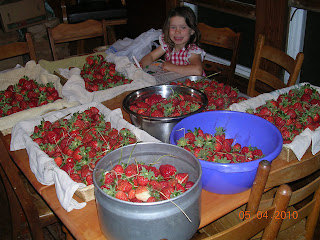May 11, 2010
What if you've become convinced that food grown who-knows-where and who-knows-how isn't what you want any more? What if you wanted to try to eat (and support the production of) only local food -- food that you either grew yourself or got directly from the source -- grown with old-fashioned organic integrity (free of any pesticides or synthetic fertilizers, etc.)? What would you have to do to make it happen? How could it be done? We want to consider these questions as they apply to a full spectrum of food groups, but for this week we want to talk about vegetables.
Vegetables may seem like the easiest food group to "go local" with, and they can pretty easily and conveniently be found from small farms and backyard growers. When it comes to vegetables, the challenges lie in eating in-season and in putting up surplus for the off-season. If you limit yourself mostly to a small handful of familiar vegetables, you're likely to encounter lots of weeks where there's little or nothing on your list that's in season. Learning to enjoy a wider variety of vegetables, besides being healthier, will surely help a lot in the effort to eat locally. Last year, even with several crop failures caused by all the spring rain, we had at least 7 (and as many as 14) different vegetables (and multiple varieties of many of those) to offer every week from the beginning of May through early November. Of course, some of those crops were more abundant and others sold out quickly, but even just from our farm there's a lot of variety to be had if you know how to enjoy it. One of the big advantages to a traditional CSA box (where members simply receive a full assortment of whatever is in season as opposed to custom ordering their boxes as our CSA members normally do) is that it encourages families to eat more like they were eating from their own gardens and to enjoy a fuller variety. Of course, eating with the seasons also means cooking with the seasons. Instead of letting a recipe or menu dictate your shopping list, eating in season generally turns things around: if you're eating in season, you'll probably start with what's fresh and in season and let that determine what you cook.
As winter begins to set in continuing to eat locally mostly means relying on crops that you froze or canned or dried or simply put in the pantry earlier in the year. Sweet potatoes, garlic, and winter squash will keep well in the pantry all through the off-season without any special attention. Freshly dug fall carrots will keep for many weeks in the fridge. Most vegetables are well suited to simple freezing: butterbeans, October beans, broccoli, collards, sweet corn, roasted eggplant, field peas, kale and all the other cooking greens, leeks and onions, okra, garden peas, bell peppers and banana peppers, also roasted peppers, spinach, fava beans, and even tomatoes and tomato juice and sauce, etc. Canning intimidates a lot of people, but there aren't really that many vegetables for which canning is the only good way to preserve them, and if you want to learn to can, it's simple. (We'd be glad to teach you.) We use canning for green beans, beets and pickles (cucumbers as well as pickled beets and dilly beans.) Irish potatoes can be kept in the pantry for a few months (longer at cooler temperatures), but we can some potatoes for later in the winter. We prefer to can most of our tomatoes (whole tomatoes, juice, sauce, salsa), but we also dry tomatoes ("sun"-dried) in a cheap dehydrator, and we freeze oven-roasted tomatoes and tomato paste. We don't actually can (with heat) our sauerkraut, but we do make it in canning jars and keep it along with the rest of our canned goods. The Ball Blue Book is the most common "guide to home canning, freezing, and dehydration", and an old version is our standard reference book. Putting up vegetables for the off-season does require planning ahead. If there are crops you'd like to put up for the off-season that you'd like to get from us, please talk to us about your particular interests ahead of time, and we'll try to help plan for you to get larger quantities of those things to preserve for later.


1 comment:
Spread the word! Knowledge is everything!
Post a Comment